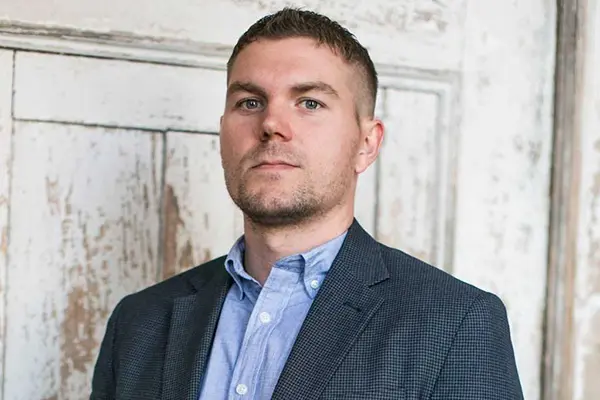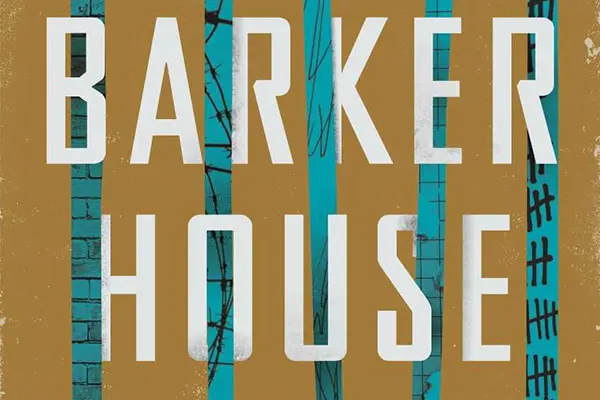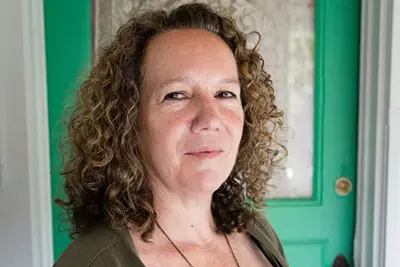Former Correctional Officer Publishes First Book
 Image by Brendon Woods
Image by Brendon Woods
06/10/2020
By Katharine Webster
In a recent essay, David Moloney ’15 recalls being pepper-sprayed in the face on his last day of training for a job as a correctional officer at the largest county jail in New Hampshire.
It was part hazing, part preparation for a job that includes the constant threat of violence, he says.
“It burns like I’ve rubbed hot sauce in my eyes,” he writes in the essay for Gen magazine. “But that’s tolerable. It doesn’t burn like the anger I feel when I’ll be ordered to lie on a report, then get in trouble for following that order. It doesn’t burn like the bleach I’ll use to clean blood off a cell’s ceiling.”
Moloney, a Lowell native, worked at the jail for five years before quitting and enrolling at Middlesex Community College and then transferring to UMass Lowell to study fiction writing with English Prof. Andre Dubus III. He transformed his jail experiences into his first book, “Barker House” (Bloomsbury Publishing), a series of linked short stories from the point of view of correctional officers that was released in early April.
In addition to his work as an adjunct faculty member in UMass Lowell’s First-year Writing Program and as a lecturer at Southern New Hampshire University, where he earned an M.F.A. in creative writing, Moloney teaches in a Middlesex County jail diversion program in which nonviolent offenders are sentenced to read books and discuss them with a judge, attorneys and probation officers.
He spoke with us recently about publishing during the COVID-19 pandemic, Dubus’ influence on his writing and teaching, his upcoming book projects and other topics.
Q: How did your jobs, first at Tewksbury Hospital working with the mentally ill and then at the Hillsborough County jail, affect you, and why did you quit to return to school?
A: I quit at the mental hospital because I was starting to go a little crazy myself. I sat on the couch for three or four months feeling sorry for myself until my (future) wife said, “Get a job, or this isn’t going to work out.”
So the jail kind of fixed me, but after five years, I couldn’t do it anymore. The pepper-spraying on the last day of the academy was this initiation into the brotherhood: They punish you before they allow you in. That was a red flag. A smarter person would have run away from that job.
And we were paramilitary: We had to salute, we had to hold the doors open for officers, say “Yes, sir” and “No, sir,” and the inmates had to make their beds so you could bounce a quarter off them, like they were in the military. It’s hard to tell someone who’s been homeless for the past five years that they didn’t make their bed the right way.
I always wanted to go back to school, but I kept telling myself I was too old. My wife supported my decision to quit the job and return to college, though. I signed up to take classes at Middlesex. I was 26 years old. I loved Middlesex – I look back at those two years fondly.
Then I transferred to UMass Lowell, because I knew of Andre (Dubus III) through his writing and wanted to learn from him. I didn’t think I could write. But my first assignment, he read a passage of mine to the class, took his glasses off and high-fived me. He said, “Now that’s literature!” He lit a fire in me.
 Image by Courtesy
Image by Courtesy
Q: What did you learn from Andre Dubus that has influenced your writing and teaching?
A: Andre made me really focus on characters. He always said, “You can have an idea for a story, but if a character tells you, ‘No, that’s not my story – this is my story,’ you have to listen to the character.” He also taught me that you need to put your characters into trouble. We want to read about conflict and desire and the consequences of the characters’ actions.
Andre also really pushed reading in the genre you want to write in. That was key for me. I read a lot of dead writers, white men in the canon, Faulkner and Hemingway. But now, as a teacher myself, I think you need to read new writers, too. I teach a lot of contemporary short stories – what was in The New Yorker last week. It’s important to read things that you’re not used to, that are out of your comfort zone. It helps you see different ways writers do it.
Q: How has the COVID-19 pandemic affected your book launch and teaching?
A: It’s been probably the worst time in recent history, other than right after 9/11, to release a book. I had 15 readings at bookstores, literary festivals, UMass Lowell and Brown University scheduled from April through June, and they all got canceled.
Just like faculty everywhere, I had to switch my creative writing and first-year college writing classes online, which was really tough. I recently spoke with the people who help me run Changing Lives Through Literature, the jail diversion program, and we don’t really know if we can do it online or not, in part because of access issues. The heart of the program is meeting every two weeks, the discussion, but I don’t know if that class translates to Zoom.
Q: How did you get involved with Changing Lives Through Literature?
A: Jean Trounstine was one of my first professors at Middlesex, and we became very close because of our experience in corrections. She had worked for years inside the state women’s prison in Framingham, creating and putting on plays with the inmates. She was an early champion of Changing Lives Through Literature. She started a class for women three decades ago that was held at Middlesex.
Jean and the other organizers invited me to start teaching a class for men two years ago, in part because of my background as a correctional officer. I’ve taught four classes now, including one that combined men and women for the first time.
Q: What are you writing now?
A: I just finished the draft of a new book of short stories that all take place along the Merrimack River. None of the characters in the stories overlap. The stories are linked through setting: They all take place in Lowell and Tyngsboro. I grew up in Lowell and I still live in Lowell. I like the idea of being a regional writer. I have a strong connection to this place, and I really think the people are interesting in the Merrimack Valley – we’re very different.
I’m working on book three now, a novel about panhandlers and a park ranger that also takes place in Lowell. There’s a murder, so it’s a little bit different than what I’ve written before. I wanted to try writing a literary thriller – and now it’s turning into a big, fat book. I’m so focused on character when I write, it’s hard to move through a plot quickly.
UMass Lowell’s Alumni Virtual Village is hosting a free online conversation between authors David Moloney and Andre Dubus III on Monday, June 23, from noon to 1 p.m. Please register in advance.




